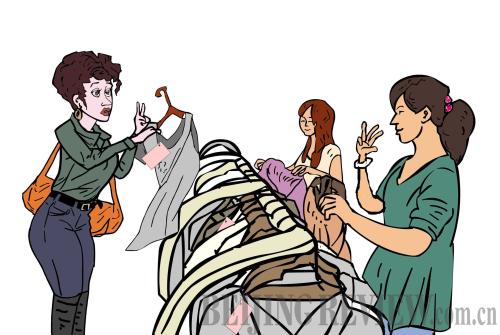|
 |
|
(LI SHIGONG) |
On my first trip to a Beijing market, my intentions were clear. I needed a cheap watch. Nothing fancy, just a wristwatch. And, maybe, I thought to myself, I would look at some shoes I could wear to work. That's it. I swear.
An hour later I emerged from the market dazed and in a fog. I was holding two shirts, a jacket and just enough money to take the bus home. I still didn't have a watch. How could this happen? I didn't even really want the jacket—and I certainly didn't want to purchase it for 300 yuan ($48). I began to notice things about my new purchase that I hadn't seen before: frayed threads on the sleeves, bad stitching on the seams and a label that read wrong.
Before I came to live in Beijing, I had read about bargaining and knew that I should haggle over prices. I heard that sellers would inflate prices by 50 percent or more. I heard one should try walking away from a negotiation to get a good deal. My first attempts, however, were pathetic and went something like this:
Salesgirl: Hey! You would look great in that jacket. I'll give you a great price. Only 320 yuan ($51)!
Me: It's a really nice jacket. How about 250 yuan ($40)?
Salesgirl: ARE YOU CRAZY? This is the finest quality jacket in all of Beijing and you will never find anything as good anywhere else. Cheapest price: 300 yuan ($48).
Me: Ok.
I'm exaggerating, of course, but not by much. Rookie Mistake #1 was giving up too easily. I set myself up by admitting that I liked the jacket, and my counter offer was too high. After a few weeks of failure, I learned to tease out a lower price by acting disinterested and increasing my counter offer in small increments. Another trick I learned was to add more items to my purchase during the negotiation. Smaller items can be used to sweeten the deal.
My competitive streak emerged and I set out to be the best bargainer in Beijing. I learned all of the tricks and traps and within a few months I was scoring some sweet deals—which led me to Rookie Mistake #2:
Salesgirl: Hey! You would look great in that jacket. Only 320 yuan ($51)!
Me: ARE YOU CRAZY? I would only pay 50 yuan ($8) for that jacket. I saw three of those down the street for less. It's falling apart. The color makes me want to vomit. I wouldn't be caught dead in that jacket. I'm leaving.
Salesgirl: How about 275 yuan ($44)? It's a good price!
Me: If you throw in the shoes, hat and bag I'll give you 51 yuan.
Salesgirl: Please leave.
Many expats hate to be mistaken for tourists because visitors are naive and pay too much. Getting a good deal is a badge of honor and means you have lived here long enough to know what locals pay. Sometimes, however, that pride can go too far. Bargaining is a sort of game and I've seen too many expats get upset and angry during a negotiation, haggle over the smallest amounts and generally behave badly if they don't get what they want. You don't get a better deal by being rude. You don't do yourself any favors by being aggressive. Be polite and friendly and things may go your way. Don't swear you only have 20 yuan ($3) in your pocket and then hand them a 100-yuan ($16) bill expecting change. Be honest. Be nice.
Once I got the hang of haggling I couldn't stop, which led me to Rookie Mistake #3. I began having conversations like this:
Me: 10 yuan ($1.61)! That's too much. Can you lower the price? Say, 6 yuan?
Salesgirl: Um, welcome to Starbucks, may I take your order?
When I returned to New York, I tried bargaining for everything. If a salesperson approached me in a store I would act noncommittal, disinterested and perhaps announce that I was leaving. Nobody seemed to care. I had become spoiled by the flattery of Beijing shopkeepers. No one told me that a jacket looked great on me. No one whipped out a calculator to negotiate a two-for-one deal. In fact, they seemed slightly offended when I told them their bags were knock-offs and that I wouldn't pay more than half price.
I miss haggling in markets. It was fun. I began to develop relationships with my favorite shopkeepers. Scoring good deals was a way to bond with my Chinese neighbors and friends. I hope as Beijing develops it will preserve its little markets and culture of bargaining. In these days of chain stores and mega-retailers shopping has become very impersonal. Learning to bargain was a part of expat life in Beijing. A cultural experience that created many good memories and friendships.
The author is an American who worked in China
Expats, we need your stories!
If you're an expatriate living or once lived in China and have a story to tell or an opinion to share about any aspect of life here, we are interested in hearing about it. We offer payment for published stories (700-900 words). Submissions may be edited.
Email us at: zanjifang@bjreview.com
Please provide your name, nationality and address along with your stories | 